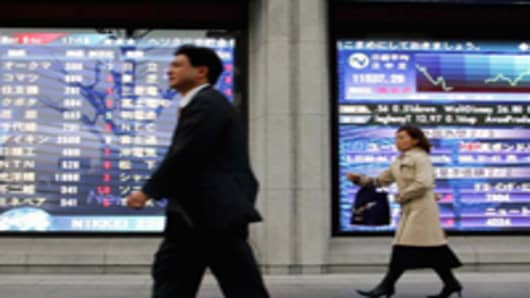The post-tsunami recovery of the Japanese economy is being hampered by the strong yen and the country needs a more concerted effort to get nuclear power stations up and running again, analysts told CNBC Monday.
Japan's economy contracted less than expected in the second quarter
, with GDP down by 0.3 percent compared to the expected 0.7 percent, according to figures released on Monday.
Manufacturing output and exports recovered from the devastating earthquake in March, which resulted in many companies slashing production and power losses across the country.
Analysts expect the world's third-largest economy to return to growth in the third quarter of 2011.
"Considering the tsunami, I think it's very commendable," Seijiro Takeshita, senior strategist at Mizuho International, told CNBC.
"The automobile sector is lagging, but it's still way ahead of the plan, and is progressing quite nicely."
The soaring yen and slowing global growth are now causing concern.
Japan’s finance minister warned that he could intervene in currency markets yet again if the strong yen continues.
“An unstable situation is continuing,” Yoshihiko Noda told public television broadcaster NHK Saturday. “As foreign exchange market matters are my prerogative, I will continue to closely watch the markets and take bold action if it becomes necessary.”
Earlier this month, the Japanese government sold an undisclosed amount of yen, with traders estimating that it had spent about $13 billion attempting to stop the currency strengthening and reducing its exports.
"They are running an intervention campaign which they thought would do the job and at the moment the evidence is that it's failing," Simon Derrick, chief currency strategist, BNY Mellon, told CNBC.
"Unfortunately, there is very little else they can do."
"The Japanese economy, and Japanese stocks, perform negatively with a strong yen."
One of the problems facing Japan is that many of its nuclear power stations are under the spotlight after the explosion at the Fukushima plant following March's earthquake.
Japan gets 30 percent of its electricity from its 54 nuclear reactors, and had been planning to expand nuclear power before the disaster highlighted safety issues.
"One of the biggest weaknesses of this government is they don't have control over the bureaucrats, and there are no unified guidelines," said Takeshita.
"This is serious because nuclear provides around 30 percent of generation and also provides stable electricity.
"The big problem is the regeneration of nuclear plants."
Japanese consumers will not increase their spending until they see an improving economy, according to Takeshita.
"Japanese investors are shaky about what's going on in the West at the moment."



